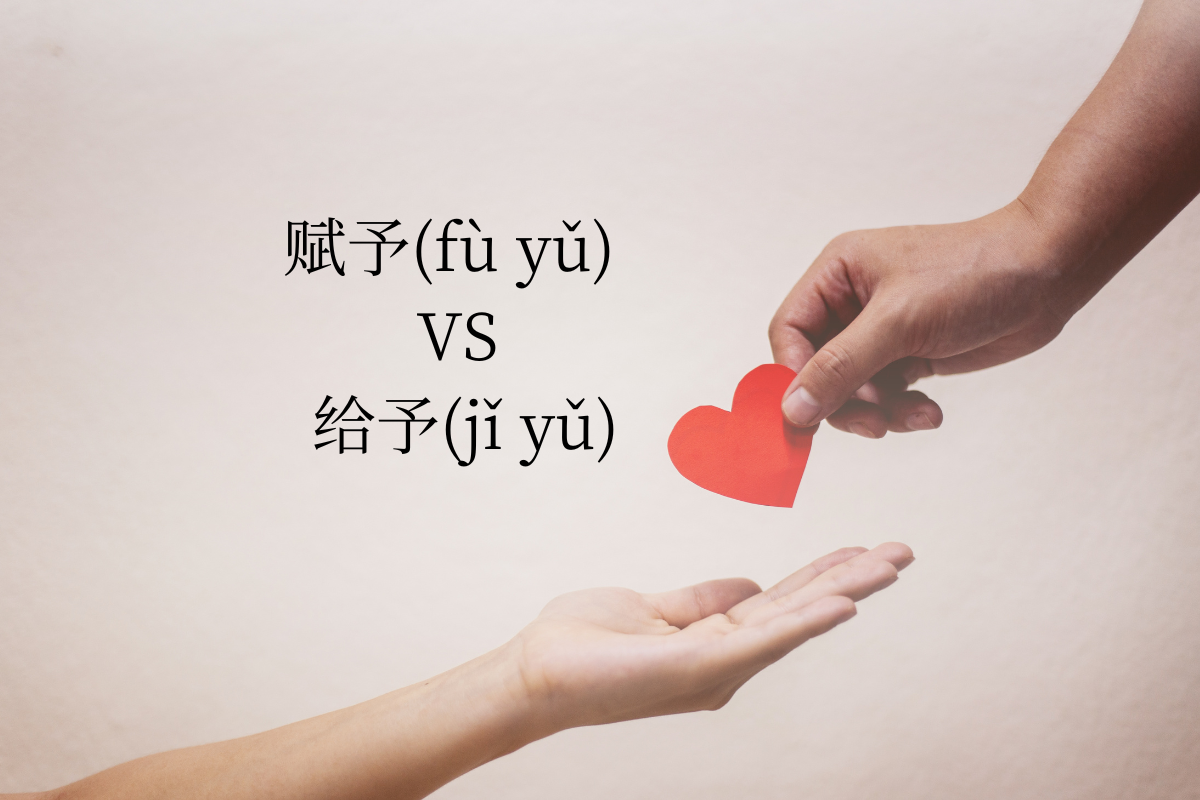HSK 5 Words: 赋予 (fù yǔ) VS 给予 (jǐ yǔ)
In Chinese language learning, the HSK words 赋予 (fù yǔ) and 给予 (jǐ yǔ) are often confused by learners. While both words can be translated as "give" in English, they carry distinct meanings that set them apart. In this article, we will explore the nuances between these two words by examining their definitions and examples of usage.

赋予 (fù yǔ) typically implies the act of endowing or providing something with a particular quality, ability, or attribute. It often implies a sense of generosity and is used in contexts where something is given voluntarily or as a favor.
Examples:
- The role gave him a whole new personality and traits.
这个角色赋予了他全新的个性和特质。
zhè gè jué sè fù yǔ le tā quán xīn de gè xìng hé tè zhì 。 - The government has given this project a high degree of autonomy.
政府赋予了这个项目高度的自主权。
zhèng fǔ fù yǔ le zhè gè xiàng mù gāo dù de zì zhǔ quán 。 - The festival is imbued with rich cultural and historical significance.
这个节日被赋予了丰富的文化和历史意义。
zhè gè jié rì bèi fù yǔ le fēng fù de wén huà hé lì shǐ yì yì 。
给予 (jǐ yǔ) implies the act of providing something to someone or something else. It is more general than 赋予 (fù yǔ) and can be used in both voluntary and mandatory contexts.
Examples:
- Please give me some water.
请给予我一些水。
qǐng jǐ yǔ wǒ xiē shuǐ 。 - The government has given financial aid to flood-affected areas.
政府给予了受灾地区财政援助。
zhèng fǔ jǐ yǔ le shòu zāi dì qū cái zhèng zhù yán 。 - Parents give their children selfless love and care.
父母给予孩子无私的爱和关怀。
fù mǔ jǐ yǔ hái zi wú sī de ài hé guān huái 。
In summary, 赋予 (fù yǔ) and 给予 (jǐ yǔ) are two distinct words in Chinese. 赋予 (fù yǔ) implies the act of endowing or providing something with a particular quality, ability, or attribute, often in a voluntary or favor-granting manner. 给予 (jǐ yǔ), on the other hand, implies a more general act of providing something to someone or something else, whether voluntary or mandatory.
Quiz: Please consider whether to use 赋予 (fù yǔ) VS 给予 (jǐ yǔ) in the following sentences.
- 这次慈善活动,他______了慷慨的捐款。
zhè cì cí shàn huó dòng , tā ______ le kāng kǎi de juān kuǎn 。 - 政府______了贫困地区经济援助和投资。
zhèng fǔ ______ le pín kùn dì qū jīng jì yuán zhù hé tóu zī 。 - 他______了这个角色独特的个性和魅力。
tā ______ le zhè gè jué sè dú tè de gè xìng hé mèi lì 。
Answers:
- 给予 (jǐ yǔ)
- 给予 (jǐ yǔ)
- 赋予 (fù yǔ)